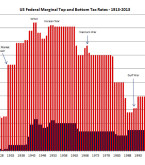Under Section 121 of the IRS Code, and spelled out in IRS Publication 523 (2013), homeowners who sell their primary residence may be able to exclude from income any gain up to a limit of $500,000 if the homeowners are married and file a joint tax return. The limit is $250,000 for a single income tax filer or a married Read More >
How Can Itemizing Deductions Affect a Homeowner’s Income Taxes?
I am often surprised to find out how few homeowners actually understand how the tax benefits of owning a house affects them. So much so that I am compelled to write about it and attempt to explain it in today’s post. In order for a homeowner to deduct mortgage interest on their income tax return the homeowner must Read More >
Is Postponing Tax Really the Best Idea?
Let’s say you wanted to borrow $10,000. What questions would you ask and want to know the answers to before you borrowed the money? I can think of at least two key questions, and probably more. What is the interest rate? How much interest do you have to pay? What is the payment? If the lender responded by Read More >
How Much of Your Qualified Plan Balance is Yours?
If you’re like most people who I ask that question, you said “All of it!” But is that true? Remember, you have elected to defer paying the tax. Let’s look at an example. Assume you are in a 30% tax bracket and you wish to make an annual contribution of $6,000 to your qualified plan. The best anyone could and should Read More >
What Do Qualified Plans Do?
Qualified plans do several things: They make it easy to save for retirement. They offer the opportunity to receive an employer match on your contributions. They defer otherwise payable income taxes. They defer the income tax calculation. Let’s evaluate each one individually. ⇒ Qualified plans make it Read More >




